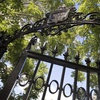{shortcode-d4eafc2ef084e1271ad180963463ace5f1e6928e}
Harvard Management Company is planning to sell nearly $1 billion of private equity fund stakes, liquidating nearly 5 percent of its private equity portfolio amid mounting threats to the University’s finances by its critics in Washington.
Though the timing of the planned transaction coincides with heightened political pressure on the University from the Trump administration — including the freezing of billions in federal research funding and looming threats of an new endowment tax — planning for the sale started 2024 in response to a general decline in liquidity in the private equity market, according to a person familiar with the strategy.
While the terms of the sale — first reported by Bloomberg — are not finalized, HMC is working to offload some of its stakes to Lexington Partners, a global private equity investor, with the advice of investment banking firm Jefferies Financial Group Inc.
Private equity is a central pillar of HMC’s investment strategy, making up nearly 40 percent of its $53 billion endowment with that share increasing every year to date.
Still, sales of private equity holdings are relatively infrequent at Harvard. HMC most recently sold nearly $1 billion in stakes to Ardian in 2021, and over $2 billion to Lexington Partners in 2017.
The private equity stakes would be sold via a secondary sale, which allows investors to purchase assets from other investors instead of directly taking stakes in private firms.
HMC spokesperson Patrick S. McKiernan declined to comment on the transaction plans.
Among Ivy League universities, Harvard is not alone in looking to sell its private equity holdings. Yale University announced on Tuesday that it was considering a sale of private equity stakes.
Rutgers Business School professor John M. Longo said that in most secondary sales, assets are sold at a discount, meaning HMC would only benefit if they need extra cash on hand — or if they believe the stakes up for sale will lose value in the future.
“In most cases, the sale of private equity securities on the secondary market is at a discount to the Net Asset Value of the investment. If this is the case with the Harvard sale, then it seems they prefer to have the extra liquidity or cash on hand as opposed to realizing the full potential of the investment,” Longo wrote in a statement.
“If the value of the private equity investment decreases in value after the sale, an event that is difficult to forecast, then selling today, even at a discount, may prove to be financially beneficial,” he added.
Harvard Business School professor Luis M. Viceira called the secondary market sale “another indication of the steps that the university is taking to build an armor of liquidity, along with the recent debt issuance.”
Harvard took part in two bond sales to borrow $1.2 billion in March and April, a move that a University spokesperson specifically called “part of ongoing contingency planning for a range of financial circumstances.”
While the transaction was planned months in advance, both the bond sales and the sale of private equity will give Harvard more cash on hand as it battles attacks on its finances from the White House.
Eastern Michigan University business professor Howard Bunsis — who has audited several universities’ finances— wrote that the nature of HMC’s portfolio being so heavily based in private equity meant the lack of liquidity was a self-inflicted consequence.
“They have chosen to put 83 percent of their portfolio in the riskiest securities, as net asset value investments are mostly hedge funds and private equity,” Bunsis wrote. “It is ironic that they complain about a lack of liquidity that they have chosen.”
—Staff writer Avani B. Rai can be reached at avani.rai@thecrimson.com. Follow her on X @avaniiiirai.
—Staff writer Saketh Sundar can be reached at saketh.sundar@thecrimson.com. Follow him on X @saketh_sundar.












